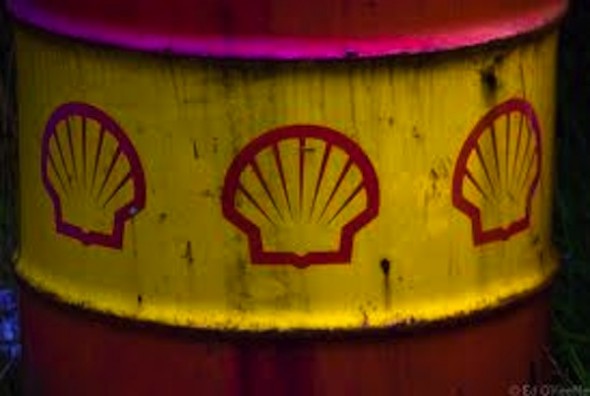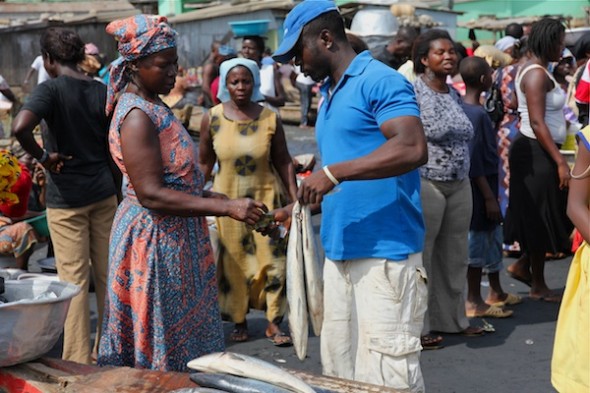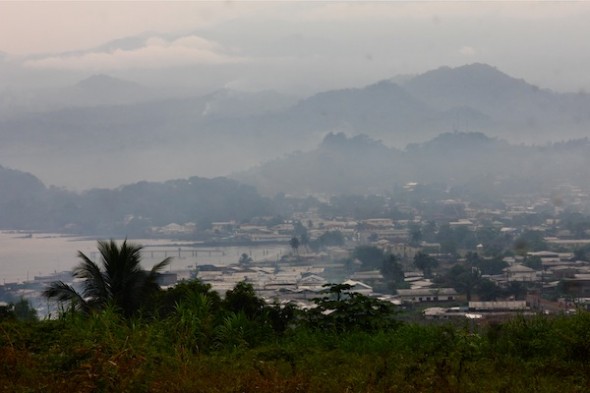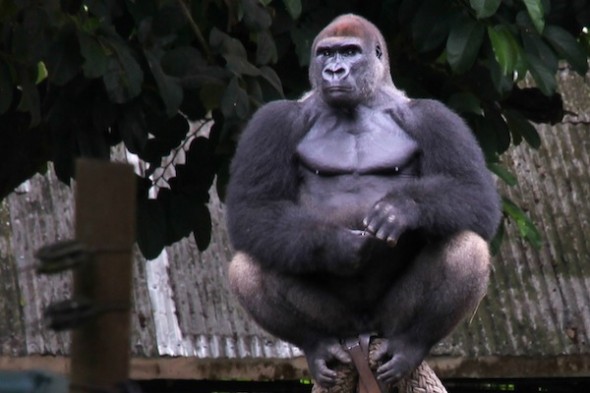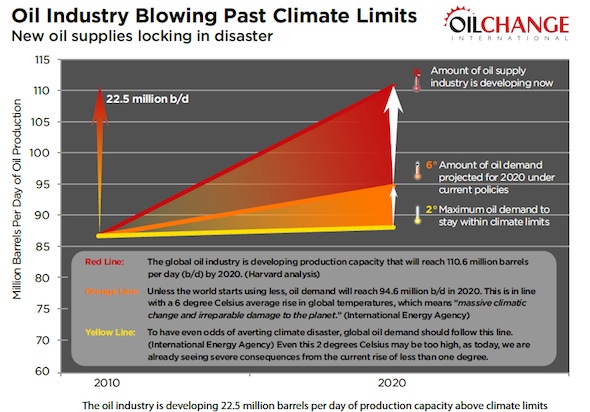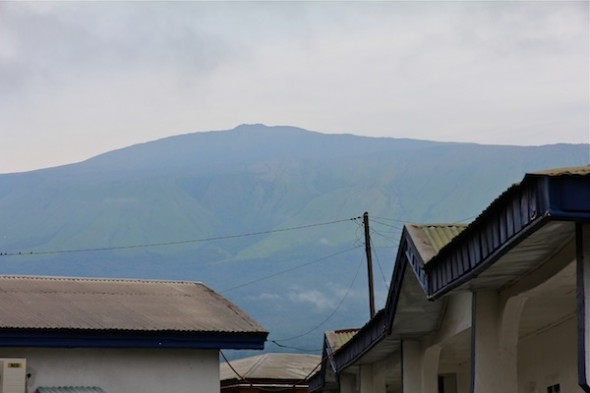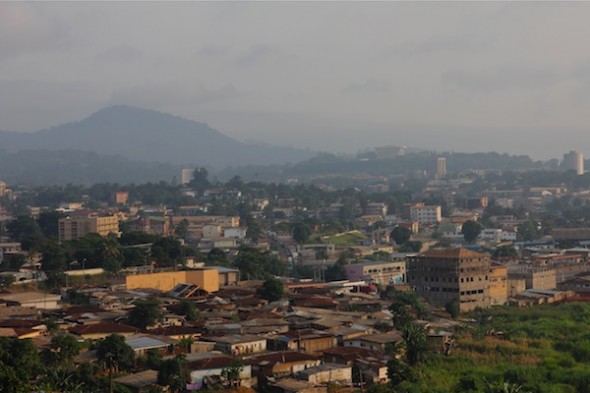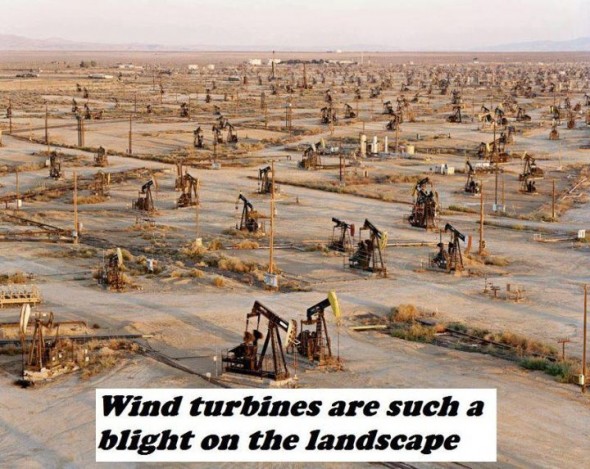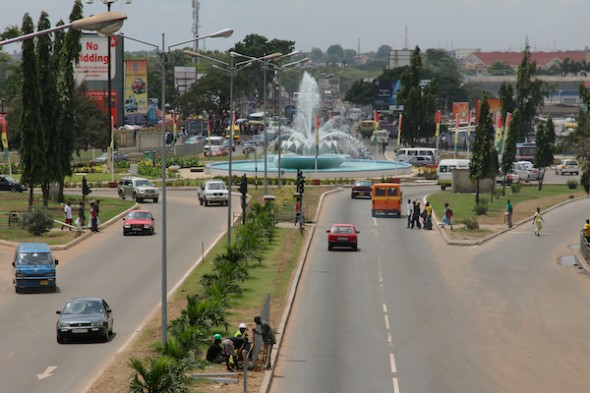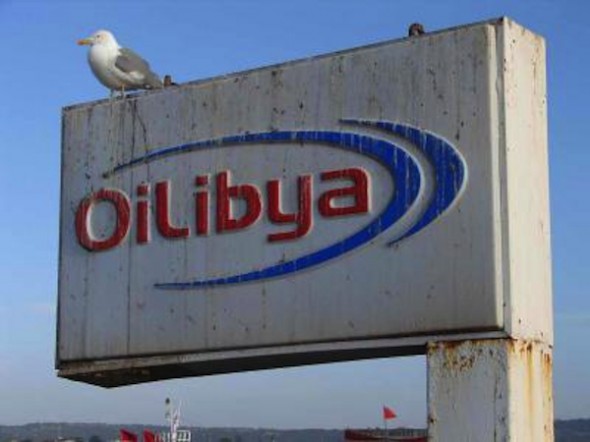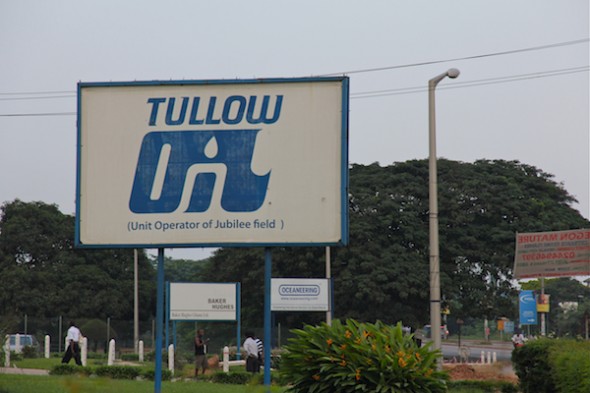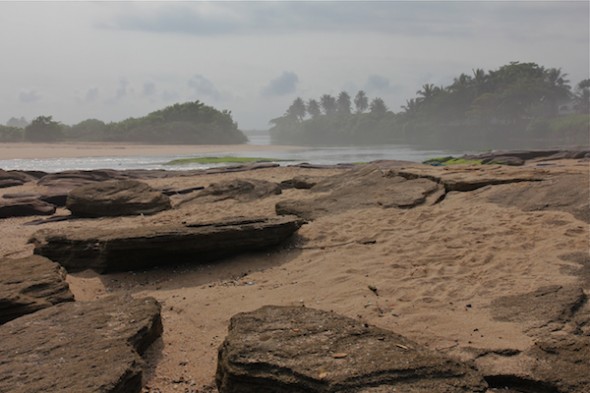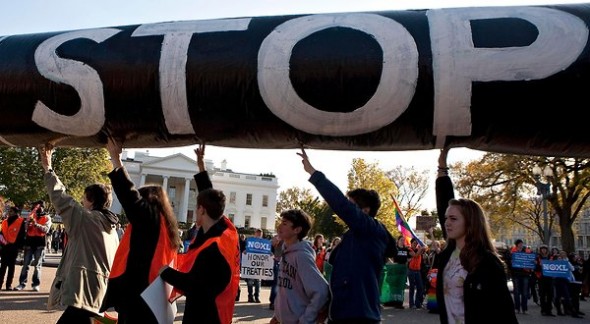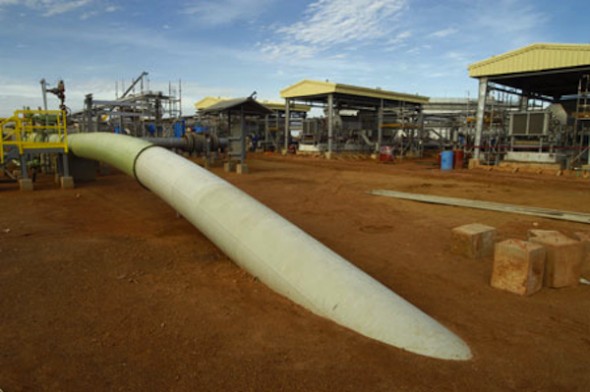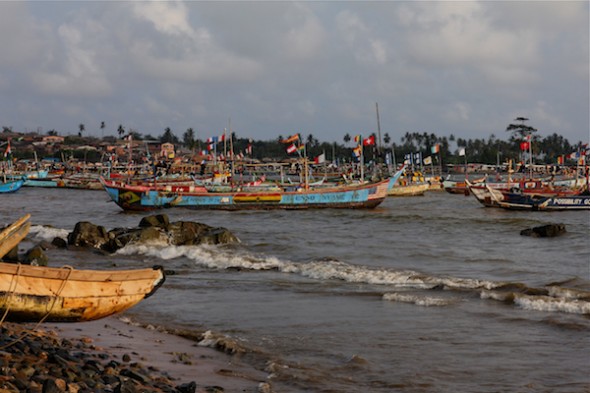Shell Shareholders at Risk from Billion Dollar Nigerian Oil Scandal, says Global Witness
Following is a press release from Global Witness:
Shell‘s role in a billion dollar corruption scandal in Nigeria poses significant hidden risks for investors, Global Witness said at the company’s 2015 AGM. The warning comes as the oil major is lobbying the UK and US authorities to undermine the implementation of new transparency laws which would consign such secretive deals to history.
The corruption at the heart of the deal deprived the Nigerian state of over U.S. $1.1 billion, triggered investigations by authorities in three countries, and could potentially lead to Shell and its Italian partner Eni losing access to the oil block.
Teodoro Nguema Obiang loses his Malibu mansion

Exterior of Malibu home — U.S. Immigration and Customs Enforcement
A 2011 photo provided by U.S. Immigration and Customs Enforcement officers shows the exterior of the Malibu home of Teodoro Nguema Obiang, the second vice president of Equatorial Guniea.
It may be a drop in the bucket, but the Obiang family will forfeit personal property in the U.S. as part of a corruption settlement.
From the Los Angeles Times:
In a settlement filed in U.S. district court in Los Angeles, Equatorial Guinea Second Vice President Teodoro Nguema Obiang agreed to give up a $30-million house with a view of the ocean, a collection of Michael Jackson memorabilia and other property, including a Ferrari, to settle corruption claims by federal prosecutors.
The settlement with Obiang, who is the son and heir apparent to the nation’s president, is part of an expanding Justice Department effort — officials call it the “Kleptocracy Initiative” — to crack down on corrupt foreign officials who steal money and use it to live the high life in the U.S.
Oil vs. fishing in Ghana — the conflicts continue
It has been ages since I’ve posted anything here (more on that below), but it seems that nothing much has changed — at least not for the fishing communities of Western Ghana. I first reported on conflicts between fishermen and Ghana’s new oil industry more than three years ago. Since then, oil exploration and drilling have increased, and the situation for fishermen has deteriorated. In the last few months three reporters have contacted me to talk about conflicts between fishing and oil.
Marine mammals continue to wash ashore in Ghana’s Western Region
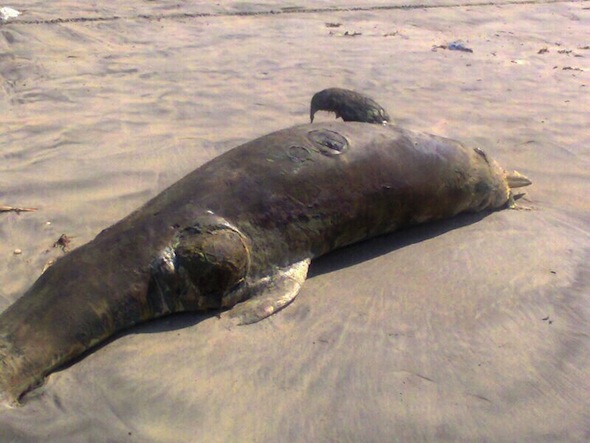
October 21st, 2013: the 19th marine mammal to wash ashore in Ghana’s Western Region since 2009. Photo: Friends of the Nation
From Friends of the Nation, Takoradi, October 23, 2013
The washing ashore of marine mammals in Ghana is still not stopping. On October 20 and 21, 2013, two more mammals were found dead at the coast of Asanta in the Ellembelle District in the Western Region. These carcasses present the 18th and 19th incidents respectively within the last four years. Citizens in the coastal areas are trying to correlate these unfortunate events to the offshore oil and gas, since the production started around the same period (2009). Two dead mammals after each other within just two days caused a shock amongst locals. People in the coastal community are asking for answers.
The crazy world of Nigerian oil
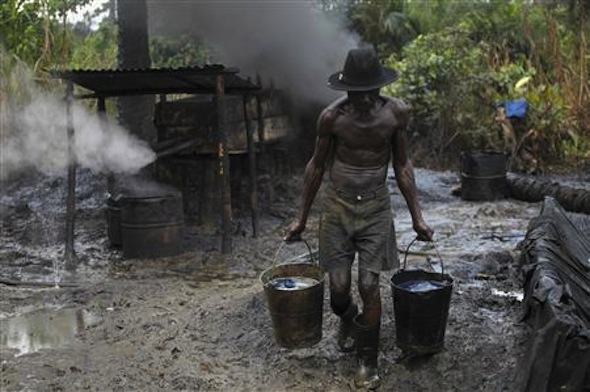
Ebiowei, 48, carries refined oil in buckets at an illegal oil refinery site. Credit: REUTERS/Akintunde Akinleye
Nigeria is experiencing difficulties selling its crude oil, but imports most of its refined oil products. No, that is not a mistake.
Nigeria Bearing Brunt of U.S. Shale Oil Boom is the title of a recent Wall Street Journal article. As the title suggests, increased domestic production in the U.S. has had a serious impact on Nigerian oil sales:
Exports of Nigerian oil to the U.S. almost halved between 2011 and 2012, according to (U.S. Energy Information Administration) data. In the late 2000s, Nigeria regularly shipped around one million barrels a day of crude to the U.S., but last year that number was just 405,000 barrels a day.
Other members of OPEC have also been affected. Exports from both Angola and Algeria fell more than 30% last year. But the impact has been the most severe in Nigeria, which has historically sent the bulk of its oil exports to the U.S., and the country has been forced to react.
East Africa and the resource curse: Where are the jobs, where is the power?
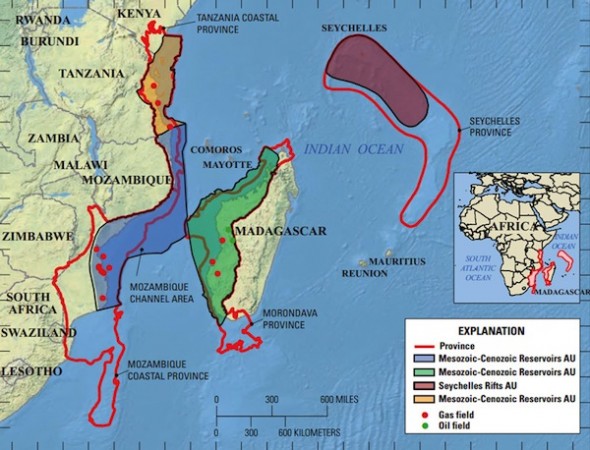
Lots of oil and gas, but will this translate into electricity and jobs? Map Credit: U.S. Geological Survey.
I’m catching up on news and have come across another recent article about East Africa’s oil and gas development. Avoiding the Resource Curse in East Africa’s Oil and Natural Gas Boom, draws attention to a fundamental problem with oil and gas development across Africa: minimal job creation and little or no increase in power (electricity).
Can any government really call oil a “blessing” if it doesn’t bring employment and power to the population?
The author, Jill Shankleman, is a senior scholar at the Wilson Center and former senior social and environmental specialist at the World Bank. “Up to now,” she writes, “oil companies and governments in developing countries have worked on a narrow model of economic benefit. Oil companies produce oil (and gas) for export. The government gets a hefty share of the profit in the form of taxes and product. To a greater or (often) lesser degree, efforts are then made to open up employment and supply chain opportunities locally.
“Where this model applies in West Africa, it is typical to find huge, state-of-the-art oil and gas export facilities sitting alongside communities where people live in houses without electricity. People like me who are involved in community consultations always hear the same thing when we speak with locals: ‘Where are the jobs? And why are we living in darkness next to this place which is stealing our oil?’”
Limbe: conflicted tourism
Limbe, in Cameroon’s Southwest Region, is a gem. A coastal city famous for its black sand beaches, Limbe is located on the southern slopes of Mount Cameroon, one of Africa’s largest active volcanoes. The town is surrounded by lush forest and is home to the Limbe Botanic Garden, a 48-hectare expanse of majestic greenery bordering the Atlantic.
The Limbe Wildlife Centre is another one of the city’s attractions. The center was founded in the early 1990s as a rescue and rehabilitation center for orphaned primates. The first time I visited the center it was an open space. I’ll never forget the gorilla who stood on two legs and walked straight up to me as if he wanted to say something. Amazing. Today, the center is divided up into compounds and feels more like a zoo, but it’s still a great place to visit and marvel the biodiversity of this country.
But there’s more to Limbe than beautiful scenery.
Drilling ourselves to desolation
African oil news today looks pretty much like any other day: a new paper from the European Centre for Development Policy Management warns that Africa must diversify to save itself from the resource curse. Nigeria is losing $1 billion a month to oil theft. The drilling race in East Africa is amping up and more gas is discovered in Mozambique. Meanwhile heavy flooding has wreaked havoc across West Africa, adding to the list of global extreme weather events.
There’s such a disconnect now between oil and weather stories that one could almost conclude that oil drilling and climate change are unrelated. But fossil fuel extraction and consumption have both immediate and long-term impacts on the the environment and those impacts are amplified across Africa. Most African countries are ill-prepared to deal with both oil spills and extreme weather events. And droughts, floods, coastal erosion and rising food prices will hit poor countries the hardest. Despite all this, there are only a few lonely voices calling to “leave oil in the soil.”
Kosmos Cameroon: Oil exploration in a national park?
Kosmos Ghana gets most of the attention, but since I’m in Cameroon I decided to take a look at Kosmos Energy’s operations here. The company has a 100% interest in two onshore blocks, the Ndian River and Fako. Kosmos is also a non-operating partner (with a 30% interest) in a third block, the Kombe-Isepe. The company’s website provides some basic information on the blocks, including their size: “The company’s acreage position onshore Cameroon is the equivalent of more than 200 deepwater Gulf of Mexico blocks.”
Both the Ndian River and the Fako blocks are located in the vicinity of Mount Cameroon and the proposed Mount Cameroon National Park. In fact, a significant percentage of the Fako block is inside the proposed national park (Fako is another name for Mount Cameroon). The Ndian River block may also overlap the western edge of the park. The Kombe-Isepe block is located further east, between Douala and Edea.
There’s no information on the Kosmos website to indicate that the Cameroonian blocks are located in sensitive areas.
Yaounde landing…
I haven’t had a chance to post anything for a few weeks. I’ve just arrived in Yaounde, Cameroon, and hope to have more time to get information up in the coming days. I’m starting some new work and will look forward to writing about it.
In the meantime, I want to provide links to a few articles up at Ghana Oil Watch. As the months go by, the Jubilee Field projected 120,000 b.p.d. output level is looking increasingly like wishful thinking. It has been hard to get clear information on why — exactly — production is so low. Tullow and its partners have repeatedly cited technical issues as the cause, yet now that those issues are supposedly resolved, why haven’t production levels increased?
Oil and fishing, again
Fish vs. Oil Part 1 from Christiane Badgley on Vimeo.
I have been busy the past few weeks and haven’t had much time for posting…But today I have to take out a few minutes to repost an article from the Ghana News Agency (via Ghana Oil Watch).
It has been more than a year since I wrote about the difficult relationship between Ghana’s fishing communities and the oil industry. It seems that nothing much has changed since. The fishing communities are still waiting for an impact assessment. Fishermen say the oil industry is impacting their activities, but without any studies, they have nowhere to go with their grievances.
Continue reading . . .
Dirty oil, dirty money…time to rethink our drilling madness?
I’ve not been writing much lately — too busy with other work. But a number of articles and reports have caught my attention.
Of course, mainstream reporting on oil is generally all good news. It’s the second golden age of oil! Drill, drill, drill. Oil and gas prices will drop! We will become energy independent! Oil and gas will transform economies! Investors will see great returns!
It’s all so wonderful that you can almost forget about climate change and corruption and the fact that we’re really not seeing oil money transform economies in a positive way. Not yet, at least. Oil is bringing in money and raising GDP, but that hardly means life on the ground is getting any better for the average citizen. And, as recent reports from Ghana suggest, oil there is boosting inflation and putting downward pressure on the cedi — hardly a benefit for the people.
ExxonMobil’s dark empire
Steve Coll’s new book, Private Empire: ExxonMobil and American Power, is out and Democracy Now! has an extensive interview with him about Exxon’s dirty dealings from Indonesia to Nigeria and Chad.
Here’s an excerpt from the interview about ExxonMobil’s involvement in Chad:
Chad, of course, is a benighted country—today about 181st out of 187 countries in the human development index kept by the United Nations indicating quality of life. Life expectancy there is still below 50 years. But it has oil. And its authoritarian leader, to put it politely, Idriss Déby, decided to try to develop this oil, even though Chad was landlocked and didn’t have any national capacity to build an oil company, so they invited in Exxon and the World Bank. And they undertook this experiment, really without precedent, to require Chad to use its oil profits for the good of its people, spending on education, health and social development. And Exxon was a participant in this and described it as potentially a new model to address the resource curse in Africa, where countries that are rich in minerals but try to develop through the sale of those minerals often fail to serve their people very well. So this was a kind of a grand experiment. And it failed.
Ghana: gas, cash and jobs
IS LOCAL CONTENT A PIPEDREAM? from Channel Two Communications on Vimeo.
There’s been a flurry of excited news coming out of Ghana the past few weeks. Ghana’s growth rate hits 16%. Ghana signs the first $1 billion of its $3 billion loan agreement with China. An additional $6 billion Chinese loan is in the works. The $1.2 billion gas plant project will soon move into high gear. Vice President John Dramani Mahama says Ghana will rake in $1 billion from gas annually and that will allow Ghana to pay off the $3 billion loan ahead of schedule. He predicts the gas industry will create hundreds of thousands of jobs. (Check out Ghana Oil Watch for articles on all this and more.)
Wow! All sounds amazing, but is it too good to be true?
Will Ghana’s Marine Pollution Bill become law this year?
I’m happy to see that Ghana’s Marine Pollution Bill is finally on the way to becoming law. I am speaking a bit optimistically here — the bill just received its first reading in Parliament a few days ago — but why not? As I’ve written at iwatch news, the pressure has been on the government to get pollution legislation passed since November’s “mystery” oil spill. Mystery in quotation marks because there is still no official word on what actually happened.
Libya’s oil today: resource curse part two?
News today from Libya and Ghana.
ThinkAfricaPress has published, “Prospects for Libyan Oil: Learning from Iraq”, an interesting article on the future of the Libyan oil industry. Here’s an excerpt:
Increasing the transparency of dealings regarding the ‘black gold’ that lies beneath Libya will be essential to ensuring balanced growth and employment for the Libyan people, but this will prove no mean feat. Given that pressure is unlikely to come from external governments, the incentives and pushes for reform will have to be generated domestically through civil society and a free media.
When getting rid of Gaddafi was so important for U.S./NATO, there was much talk about his abuse of the country’s oil wealth. Now that he’s out of the picture, it’s like, “who cares?” As long as the oil flows…
One year already…
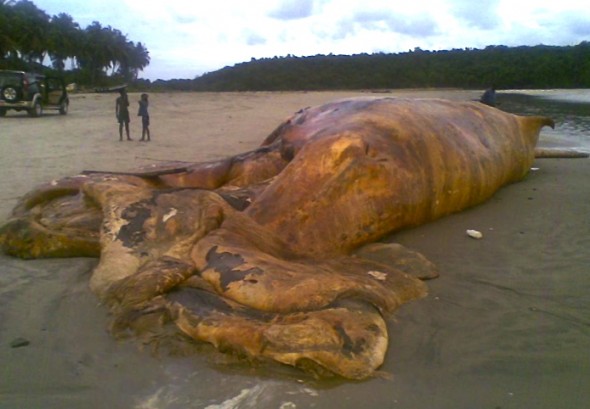
The eighth dead whale to wash ashore in the Western Region since late 2009. The Ghana EPA says there's no connection to oil drilling, but doesn't offer any details to back up the assertion. Photo courtesy of Friends of the Nation.
Yes, Ghana has been an oil producing nation for one year now.
One year on and where do things stand? In terms of environmental oversight, not much has changed and there remains much progress to make.
Off the radar…
I’m working on a story about the regulation and oversight of the offshore industry across the Gulf of Guinea and should be wrapping it up in a few weeks. That’s been keeping me from posting much lately.
Three weeks have now passed since the spill in the Ahanta West District. I am still unable to communicate any official, on-the-record information about what happened. A few days ago, the Ghana EPA said that the whale deaths in the Western Region could not be “attributed” to oil exploration, stating that there is no scientific proof for that claim. But the main thing to glean from the EPA statement is that no one knows what has caused the recent deaths. We can’t say they were provoked by the oil operations, but we can’t say they were the result of anything else, either.
There’s more news coming out about Jubilee’s production problems. When Ghana’s oil production began in December, the Jubilee partners estimated that production levels would rise to 120,000 b.p.d. within six months. But the “ramp up” has been delayed repeatedly and last month Anadarko, responding to stockholder concerns, went as far as saying that some well redesign was necessary. What had been a delay began to look like a real problem.
From Ahanta West to Accra
Nearly two weeks have passed since fishermen first spotted an oil slick offshore in the Jubilee field area. As they predicted when reporting what they had seen, the oil drifted to shore where it remained until local community members cleaned up the mess.
I’ve been trying to get more information on this spill, which according to someone at EPA, came from a tanker. There’s no way to know with any certainty that this is the case. All the information I have been able to get so far is unofficial. To date there has not been any official statement on the spill — either its source or the amount of oil spilled.
Meanwhile over in Accra, concerns are growing about the financial side of the oil business. I’m pasting an article from VOA below. The reporter writes that,”There remain serious risks the current boom will not be beneficial to most Ghanaians,” and continues with a description of ongoing problems.
Yes, No or…
I’m going to post some additional information on the recent spill in the Ahanta West District, where local communities have more or less finished cleaning their beaches, themselves, without any information from authorities about the source or size of the spill.
In the meantime, in response to massive protests against the proposed Keystone XL pipeline, Obama has decided to…study an alternative route. Decision delayed until after the election: It’s hard not to see this as anything other than pure political calculation.
Unfortunately, the Obama Administration makes no mention of global warming in the decision to delay the decision.
Oil Spill in Ahanta West District
An oil slick, first spotted by fishermen November 3rd, has washed ashore in the Ahanta West District. At this point there is little information available. The government is suggesting the oil leaked from or was dumped by a tanker, but is providing no proof or details. Fishermen report first seeing the slick near the Jubilee field and some suspect that the spill is related to the oil activities. Neither Tullow Oil nor any of the other partners has made any statements, so at this point, it is difficult to know what happened.
Shell in the Niger Delta: It gets uglier with each revelation
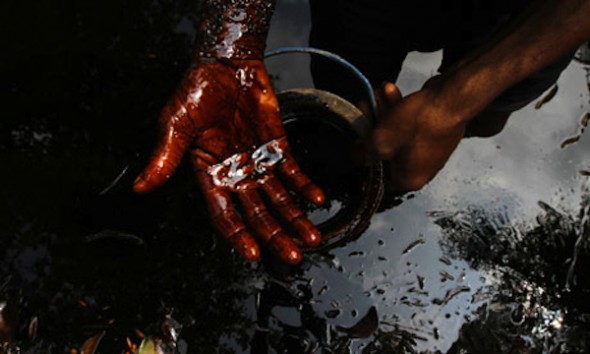
Shell oil activities in Ogoniland in the Niger delta have polluted rivers. Photograph: Akintunde Akinleye/REUTERS
Several damning articles have been been published in The Guardian (U.K.) over the past few days.
Sunday’s headline, Shell oil paid Nigerian military to put down protests, court documents show, gets right to the point.
John Vidal, Environment Editor, writes: “Shell has never denied that its oil operations have polluted large areas of the Niger Delta – land and air. But it had resisted charges of complicity in human rights abuses.
“Court documents now reveal that in the 1990s Shell routinely worked with Nigeria‘s military and mobile police to suppress resistance to its oil activities, often from activists in Ogoniland, in the delta region.
Pipeline oversight: Are independent monitoring panels effective, truly independent?
Over the past few weeks I’ve been scrutinizing documents on the safety and oversight of the Chad-Cameroon pipeline. As I wrote in an initial blog post, the ruptured ExxonMobil pipeline and subsequent oil spill in the Yellowstone River in Montana got me thinking about similarities with the ExxonMobil pipeline that crosses no fewer than 17 major rivers in Cameroon. I then wrote a follow-up post on pipeline oversight (or lack of).
So I was thrilled when I found out that Oxfam America was preparing a new report on the monitoring of controversial oil and gas projects featuring the Chad-Cameroon pipeline as one of its case studies. The report, Watching the Watchdogs, was launched yesterday in Washington, D.C. Among the speakers at yesterday’s panel were Jacques Gérin and Nadji Nelambaye who were both involved with monitoring the Chad-Cameroon pipeline.
Gas flaring and Axim: an update…sort of
Last month I wrote about strange eye infections in Axim that some locals blamed on gas flaring. Axim, or Tired of Talk, I titled the post because local citizens were frustrated with talk that rarely seemed to get followed by action. When I visited Axim in August residents had been waiting several months for oil company officials to carry through on promises to send out a medical team for screenings.

